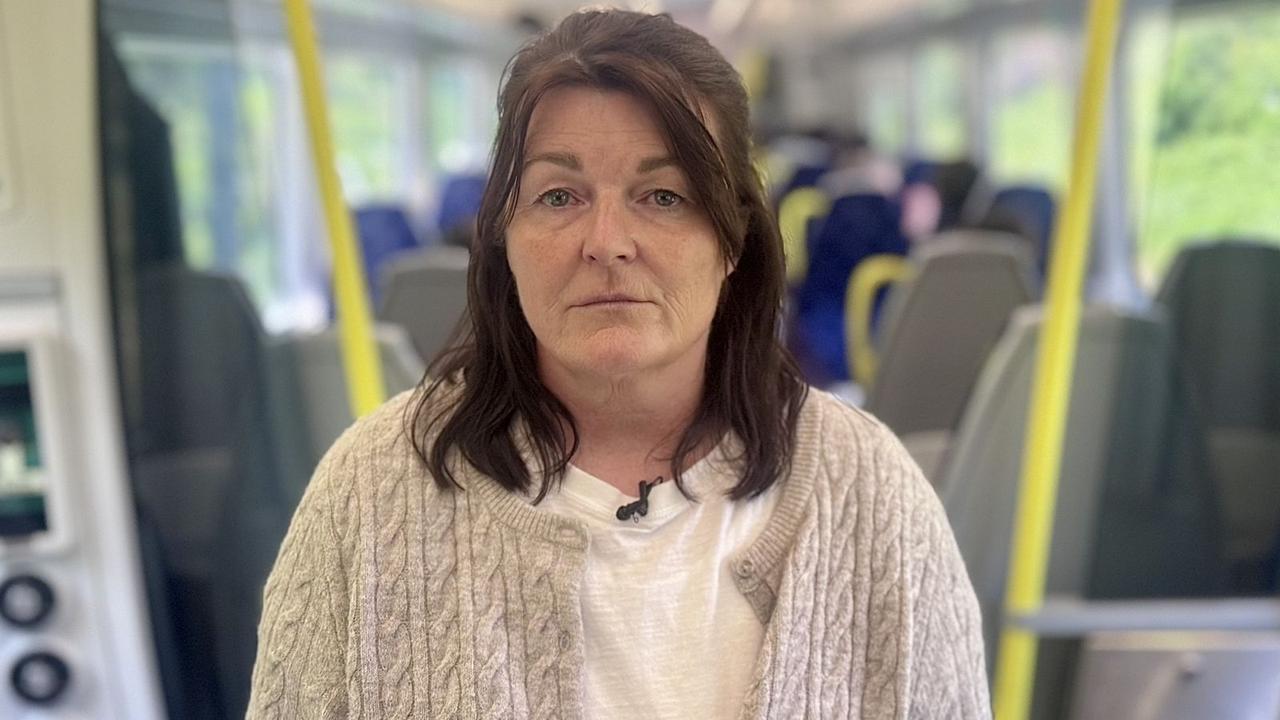AI Voice Controversy: ScotRail's New Announcer Sparks Debate on Voice Rights and AI Ethics
2 Sources
2 Sources
[1]
I've heard the same train announcement voice for 30 years, but now it's been replaced by AI - and Scotland isn't happy
A voice actor claims the company is using her voice without permission, but ReadSpeaker says it has "comprehensively addressed" these complaints If you live in Scotland, or have ever visited our beautiful country and travelled on a train, you'll have probably heard the homely lilt of the female voice announcing station stops and other information. However, train company Scotrail has now replaced the iconic voice with AI, sparking uproar among commuters - and claims from a voice actor that Scotrail has stolen her voice. The new AI announcer is called Iona, and the robotic voice has replaced the human one that the majority of Scots have grown up with. Iona is currently rolling out on routes across Scotland, but so far has been met with hostility. The AI voices uses text-to-speech technology that allows train conductors to input announcements that are then spoken across the public address system by Iona. Following the initial backlash against the AI voice rollout, Scotrail responded on X, saying, "Give it time and it may grow on you." One person the voice isn't growing on is voice actor Gayanne Potter, who's accused the Scottish Government-owned train company of stealing her voice. Potter is a voice actor who did some work for the Swedish company ReadSpeaker in 2021. ReadSpeaker is the company behind Iona, and at the time, Ms Potter was told her voice work would only be used for accessibility and e-learning software. After a friend sent her a link to ReadSpeaker's website, Potter recognized the voice, noticing similarities between her own tone and that of Iona, a persona that Scotrail is marketing as a red-haired Scottish woman, with an image that's also - of course - AI-generated. Ms Potter told the BBC, "It is my voice - I'm absolutely certain it's my voice." Potter has been in a dispute with ReadSpeaker over the use her voice for two years. In response to the complaints, ReadSpeaker told the BBC, "ReadSpeaker is aware of Ms Potter's concerns, and has comprehensively addressed these with Ms Potter's legal representative several times in the past." In the BBC report you can listen to a comparison between Ms Potter and Iona. There's no denying the voices are very similar, although the real issue here is the protection of workers in the creative industry, and awareness of how they sign over their rights when producing work. Potter said, "It's hard enough for people in the creative industry to sustain careers, but to be competing with a robotic version of yourself just adds insult to injury." This is just the latest controversy in the debate over who owns what in the rapidly evolving world of AI. Potter says she didn't know at the time that her voice would be used to train a robotic one heard across Scotland. Now, she can't escape her 'own' AI voice.
[2]
Voiceover artist Gayanne Potter urging ScotRail to remove her voice from new AI announcements
Gayanne Potter is one of Britain's most recognisable voices - behind adverts for the likes of Estee Lauder, Apple, LBC radio, and B&Q. Now, an artificial intelligence (AI) version of her voice is being used on Scotland's nationalised train network, ScotRail. But the professional voiceover artist says she had no idea she had been transformed into a robot until a friend called her last week. "I was devastated, I was furious, I feel completely violated," she told Sky News. "My voice is my job, and I should be allowed to know who I am working with and what I am working on." Ms Potter, who lives on the outskirts of Edinburgh, believes the incident can be traced back to a job she completed during the COVID pandemic with Swedish company ReadSpeaker, where she recorded scripts for the visually impaired. Ms Potter alleges she was unaware the contract allowed her voice to be sold as part of AI years later. Sky News has seen correspondence where the company appeared to reassure Ms Potter's agents they "would never sell them (the recordings) to anybody else". Responding to concerns, ReadSpeaker insisted there was a "very clear contract" that allows it to "use... synthesised voices for businesses and organisations". ScotRail unveiled its new AI announcer, nicknamed "Iona", on board the railway network in Scotland this month. The new technology has drawn criticism for mispronouncing place names, with officials asking the public to "give it time". Sky News joined Ms Potter on board a train as she discussed the situation. She said: "I literally didn't know. ScotRail never approached me, ReadSpeaker never approached me. "ScotRail have said it is not a real person. It is a real person, and I am right here. "This is a real threat. I have worked really hard for the past 20 years and built trust with clients I work with. And now to have my voice in this dreadful robot is demeaning to me." She added: "I do not consent to my voice data being used. To find out that my personal human data is being used on the trains is appalling. "I feel like my data is being burgled. I have no control over it." Read more: Cloned voices 'could become as common as stunt doubles' Stars release silent album in protest at AI copyright plans Union Equity, which represents workers in the creative industries, is helping Ms Potter fight her case. Liam Budd, industrial official for recorded media at Equity, said: "It is extremely exploitative for companies to use and commercialise voice recordings to create digital replicas of artists from contracts which pre-date the development of generative AI or were not drafted explicitly for this purpose. "Gayanne is directly competing in a marketplace with a low-quality clone of her own voice that she claims was developed without her informed and explicit consent. "Not only is this distressing for her, but it would represent an infringement of our members' data protection and other rights." Roy Lindemann, chief marketing officer at ReadSpeaker, dismissed questions from Sky News about Ms Potter's wishes to withdraw her voice from being sold. He said the firm was aware of Ms Potter's concerns, adding: "ReadSpeaker and Ms Potter have a contract regarding the use of her voice. "ReadSpeaker has comprehensively addressed Ms Potter's concerns with her legal representative several times in the past." ScotRail, which is owned by the Scottish government, said it had "no plans" to remove its "Iona" AI announcer voice system and rejected questions about Ms Potter's concerns. Phil Campbell, ScotRail customer operations director, said: "We are always looking at ways to improve the customer journey experience, and we know how important both on-train and at-station announcements are. "The use of an automated voice allows us to have more control over the announcements being made, ensures consistency for customers, and gives us flexibility to make changes at short notice." A Transport Scotland spokesperson said: "While sub-contracts are a matter for ScotRail, the Scottish government expects it, as a publicly controlled organisation, to ensure all agreements entered into are within the parameters of Public Sector Procurement guidance and meet Fair Work principles.
Share
Share
Copy Link
ScotRail's introduction of an AI-generated voice for train announcements has ignited a controversy, with voice actor Gayanne Potter claiming her voice was used without proper consent, raising questions about AI ethics and creative industry rights.
ScotRail's AI Voice Rollout Sparks Controversy
ScotRail, Scotland's national train company, has recently introduced an AI-generated voice named "Iona" for its train announcements, replacing the familiar human voice that commuters have grown accustomed to over the past 30 years
1
. This move has sparked a heated debate among passengers and raised significant questions about the ethics of AI voice technology and the rights of voice actors in the creative industry.Voice Actor's Claims and Legal Dispute

Source: Sky News
At the center of this controversy is Gayanne Potter, a professional voice actor with an impressive portfolio including work for major brands like Estee Lauder, Apple, and LBC radio
2
. Potter alleges that ScotRail and ReadSpeaker, the Swedish company behind the AI voice technology, have used her voice without proper consent to create "Iona"1
2
.Potter claims she recorded scripts for ReadSpeaker during the COVID pandemic, intended for accessibility and e-learning software. However, she was unaware that her voice recordings could be used to train an AI system or be sold for commercial purposes
1
2
. The voice actor expressed her distress, stating, "I was devastated, I was furious, I feel completely violated. My voice is my job, and I should be allowed to know who I am working with and what I am working on"2
.ReadSpeaker's Response and Contract Dispute
ReadSpeaker, the company responsible for developing the AI voice, maintains that they have a clear contract with Potter that allows them to use synthesized voices for businesses and organizations
2
. Roy Lindemann, chief marketing officer at ReadSpeaker, stated that they have "comprehensively addressed Ms Potter's concerns with her legal representative several times in the past"2
.However, Potter and her representatives argue that the contract did not explicitly cover the use of her voice for AI-generated announcements or its sale to third parties like ScotRail
1
2
. This disagreement highlights the complex legal and ethical issues surrounding AI voice technology and the importance of clear, comprehensive contracts in the rapidly evolving AI landscape.Related Stories
Public Reaction and Industry Implications
The introduction of "Iona" has been met with mixed reactions from the Scottish public. Many commuters have expressed dissatisfaction with the AI voice, citing issues such as mispronunciation of place names
2
. ScotRail has responded to the backlash by asking the public to "give it time"1
.This controversy has broader implications for the creative industry. Liam Budd, an industrial official for recorded media at Equity, the union representing workers in creative industries, stated, "It is extremely exploitative for companies to use and commercialize voice recordings to create digital replicas of artists from contracts which pre-date the development of generative AI or were not drafted explicitly for this purpose"
2
.The Future of AI Voice Technology and Creative Rights

Source: TechRadar
The ScotRail AI voice controversy underscores the urgent need for clearer regulations and ethical guidelines in the rapidly advancing field of AI voice technology. As AI-generated voices become more sophisticated and widely used, protecting the rights of voice actors and ensuring fair compensation for their work will be crucial
1
2
.This incident also raises important questions about data protection, consent, and the potential impact of AI on jobs in the creative industry. As Potter pointed out, "It's hard enough for people in the creative industry to sustain careers, but to be competing with a robotic version of yourself just adds insult to injury"
1
.As the debate continues, it's clear that the integration of AI technology in public services and creative industries will require careful consideration of ethical, legal, and social implications to strike a balance between innovation and the protection of individual rights.
References
Summarized by
Navi
Related Stories
Recent Highlights
1
ByteDance's Seedance 2.0 AI video generator triggers copyright infringement battle with Hollywood
Policy and Regulation

2
Demis Hassabis predicts AGI in 5-8 years, sees new golden era transforming medicine and science
Technology

3
Nvidia and Meta forge massive chip deal as computing power demands reshape AI infrastructure
Technology








